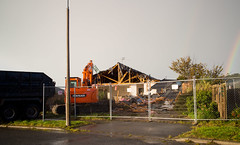
Search
Images for All Right; more images...
Blessed Rainbow
Images, eqnz.chch.2010
Catholic Basilica, Christchurch - at the right place, at the right time...
Rosie Belton - Wild Cook
Audio, Radio New Zealand
Former drama teacher and casting director Rosie Belton (right) has a motto she lives by: "When all else fails - cook!" Her new book Wild Blackberries explores her life through food. It's about how food enhances the feeling of celebration, and comforts in times of sadness. Having lived through nearly four years of earthquakes in her hometown of Christchurch, Rosie tells Wallace Chapman about why the kitchen and dining table provided so much solace in such unstable times.
We Lived Here: Bangor Street Photograph 13
Images, UC QuakeStudies
A photograph looking north along the footpath of Bangor Street. To the right there are the former sites of several houses. The houses were demolished after the land was zoned Red.
20140110_7484_1D3-40 Avon River and earthquake damage
Images, eqnz.chch.2010
Low tide on the Avon River at New Brighton/Bexley. Note the original bank and the rock wall slipage on right. The white additions were added in March and April 2011 to protect the properties behind from flooding. Ultimately this area was "red zoned" with all houses removed or to be removed and the ground left till a rehabilitation method can ...
CityUps Video Clip 2014:10:25 20:56:44
Videos, UC QuakeStudies
A video clip of two large-scale, temporary installations titled Upload (left) and Equilibrium (right). The installations were created by students from The University of Auckland, for CityUps - a 'city of the future for one night only', and the main event of FESTA 2014.
20140526_8961_EOS M-22 It is happening now
Images, eqnz.chch.2010
My house (bought in March 2004) till the government procured it in October 2012, is finally being demolished. It will be an empty section in a couple of days, once they rip up the concrete base. Note the rainbow on right.
20140927_2219_1D3-24 Planting natives at Harold Henry Park
Images, eqnz.chch.2010
A planting of native bushes and trees in the old children's playground area in Bexley, Organised by the Facebook group Avon River Park and assisted by ex Bexley residents. This is right in the middle of the Bexley red zone with most houses removed or demolished now.
Investigating Burnout among University Students in a Post-Disaster Environ…
Research papers, University of Canterbury Library
Tertiary students, not just working populations, might be experiencing feelings of burnout following the Christchurch earthquakes of 2010 and 2011. In the aftermath of a major disaster, the gap between the resources available to handle pressures (e.g., support) and the demands inherent in the pursuit of an academic degree (e.g., heavy workload) may lead to feelings of burnout among students. This study hypothesised that burnout dimensions (emotional exhaustion and disengagement) would be related to students’ perceptions of immediate institutional support, extended institutional support, peer support, family support, and work overload. Additionally, it was proposed that institutional and social support would moderate the relationship between work overload and burnout. Two hundred and seventy one third and fourth year students were sampled using an online questionnaire. These particular students were expected to be at greater risk of emotional exhaustion and academic disengagement because they were at the earliest stage of their tertiary education when the major earthquakes first hit. Family support and extended institutional support were found to be associated with decreased levels of emotional exhaustion and disengagement. Meanwhile, work overload was found to be related to increased levels of emotional exhaustion and disengagement. Furthermore, both peer support and immediate institutional support were found to have a moderating effect on the relationship between work overload and disengagement. This study has exposed unique findings which contribute to burnout research especially in a post-disaster context, and raises the importance of providing the right types of support for individuals who are particularly dealing with the consequences of a natural disaster.
- 1


